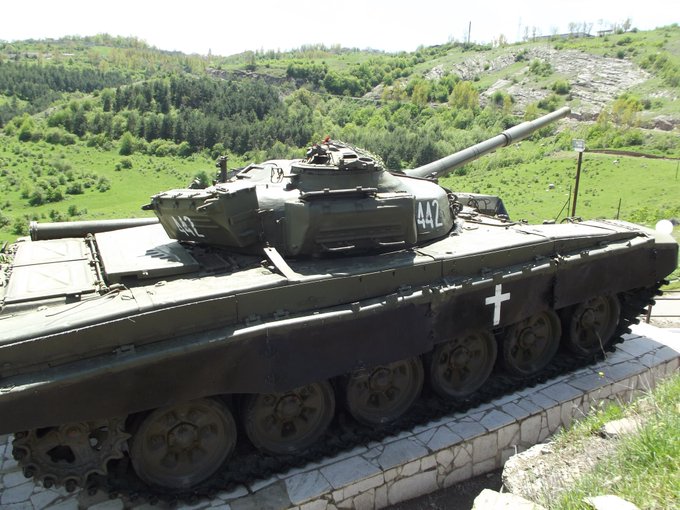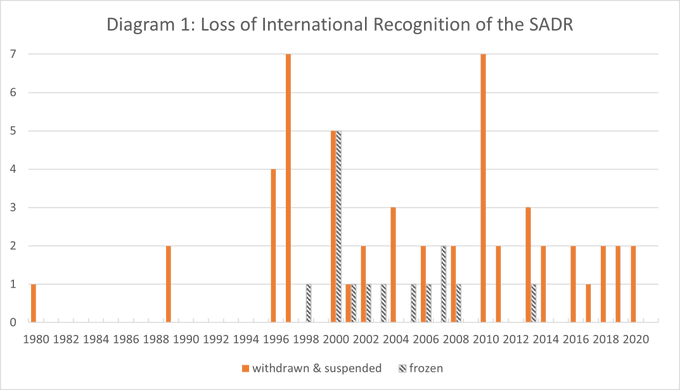Palestine Perceived as a Hypothetical Twin of the Irish Republicans
On May 26th Ireland became the first European Union member state to officially declare that when Israel is building settlements in Palestinian territories, it is committing a de facto annexation. European countries are quite willing to criticise Israel for violating international law with building settlements. Yet using the term of ‘annexation’, even with a clause of ‘de facto’, has so far eluded European governments, most likely because it would create a moral necessity to take steps against Israel’s actions. Instead, they opt for diplomatic ambiguity and publically vocalizing their concerns.
The Irish government’s declaration followed 11 days of intense violence in the Gaza region, during which Hamas fired over 4,300 rockets towards Israel, who in turn responded with air strikes. Hamas escalated the conflict during a so-called perfect storm in Jerusalem, where a mix of factors created tensions and clashes on the street.
Among these was a potential eviction of six Palestinian families from the Sheikh Jarrah neighbourhood in East Jerusalem, where the Jordanian government had built homes on the land evacuated by Jews during the 1948 war. A court hearing was supposed to be held on May 10th, but was postponed due to clashes and thus far no decision has been made.
Israeli settlers and the government consider the issue as a property dispute and frame it as a private legal matter, while the Palestinians see it as a microcosm of the Arab-Israeli conflict. This is because the Israeli law passed in 1968 allows the Jews to reclaim lost property in East Jerusalem, but do not provide the Palestinians the same right in West Jerusalem.
In the background there was a story of two elections. The Israeli general election in March had strengthened the far right extremists who gained 6 seats in the Knesset. At the same time, the cancelled Palestinian elections disappointed Hamas and did not provide a venue to let off steam for the Palestinian public. Furthermore, when the police temporarily closed the Damascus gate at the beginning of Ramadan, the Palestinian community in the city saw it as yet another example of the supremacy of the Israeli security forces.
The intense round of warfare led to many pro-Palestinian civil society demonstrations in Europe and the US. Several governments tried to call for a cease-fire resolution in the United Nations Security Council, but were blocked by the US. At the same time, several European politicians such as members of the German and Austrian governments demonstrated their on-going support to Israel with visits to the country.
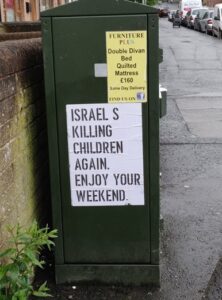
Image: On the street crude posters draw attention to Israel’s policies in Gaza. Belfast, 2019 (Source: Merili Arjakas)
The Irish seem to have no such qualms. In 1980 Ireland was the first European Union country in a joint declaration with Bahrain to endorse the establishment of a Palestinian state. In 2014 both Houses of the Parliament passed a motion urging the government to recognise Palestine as a state, but this act was non-binding and has not been carried out. Instead, a former minister of foreign affairs has argued that Palestinian statehood should be recognised when the Palestinian National Authority is in full and sole control over its territories.
While Irish-Israeli relations in the last decades cannot be characterised as hostile, they have been marked by several diplomatic spats over the Irish parliament’s support for the Boycott, Divestment and Sanctions movement, over a case when Mossad had used Irish passports in an assassination operation, and among other things. Thus, the declaration of ‘de facto annexation’ is the latest event in a long list of instances when the Irish have been more supportive of the Palestinians than most of the other European governments.
Perhaps the most interesting aspect about Irish support for Palestine is that it has not always been the case. Rory Miller describes in Foreign Policy that in the 1920s and 1930s the Irish saw the Zionist cause of establishing a Jewish homeland as similar to their own national aspirations, especially because both saw the British as their main adversary. After the partition of Palestine, however, the Irish began to draw parallels between the Palestinians in a divided land and their own six counties of Ulster, the northern province of Ireland under British control.
Miller also emphasizes the Vatican factor. The Catholic Church used to have great influence over Irish social and political life and the Irish government was keen to adopt their positions, especially over the status of Jerusalem’s holy places. Likewise, the Irish government thought that Jerusalem should be put under international supervision. Among Western European countries Ireland was relatively late to de jure recognise Israel’s independence, which they finally did in 1963.
After the 1967 War, Ireland became increasingly concerned with the fate of Palestinian refugees. Relations between Israel and Ireland became even worse during the Lebanese Civil war, when Ireland lost 45 soldiers in a UN peacekeeping mission and blamed Israel for a third of them. During the Second Intifada Ireland’s foreign minister visited Yasser Arafat and described him as the symbol of hope.
Jason Walsh writes in the New Republic that as Israel became more successful, more modern and thus recognisably Western, Irish support waned because they were perceived as the stand-ins for the British. Thus, the aspects of the Israeli-Palestinian conflict are seen through the lenses of the Irish approach towards the British, as visualised in the streets of Belfast.
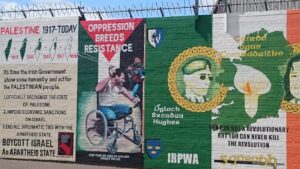
Image: Drawing parallels in conflicts between the natives and settlers (Source: Eiki Berg)
Miller describes a mural in Belfast from the 1980s that compared the Irish Republican Army and the Palestinian Liberation Organisation as being parts of one struggle.
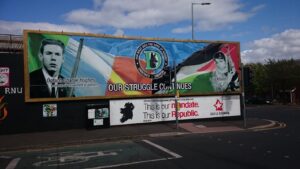
Image: Irish and Palestinians are part of the ‘same struggle’ (Source: Eiki Berg)
For example, Óglach Charlie Hughes depicted on the mural in Belfast in 2019 was a Provisional IRA commander who was shot dead on 8th March 1971 in a feud between the Provisional and Official IRAs. Next to him is a picture of Leila Khaled, a member of the Popular Front for the Liberation of Palestine who took part in aeroplane hijackings in 1969 and 1970. Leila Khaled’s face also features prominently in pro-Palestinian wall art on the West Bank barrier.
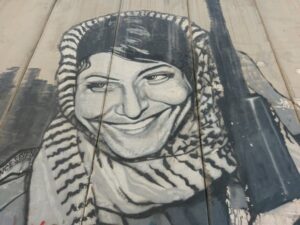
Image: Leila Khaled on the West Bank Barrier, 2017 (Source: Merili Arjakas)
Judging by the newer murals in Belfast this division has not changed even after achieving peace in Northern Ireland. In the late 2010s some Irish nationalists painted the Palestinian flag and prominent militants such as Leila Khaled to emphasise a perceived shared suffering.
Partly as a reaction to pro-Palestinian sentiment among the Irish, the Unionists in Northern Ireland adopted pro-Israeli positions. Some Loyalists use Israeli symbols such as the flying the Israeli flag to draw parallels between two communities they see both as being under siege. However, the Unionists also use the six-pointed star to represent the six counties of Northern Ireland, thus making it difficult for outsiders to distinguish between the two expressions of solidarity. By using this simplified division, the actual similarities and differences lose their importance, because continued use of the symbols gives them enough meaning.
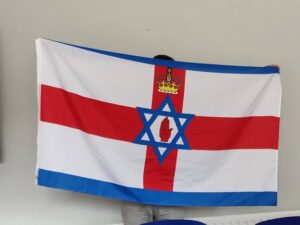
Image: While this might seem as the Star of David, the six-pointed star represents the six countries of Ulster. But who would tell the difference? (Source: Merili Arjakas)
Rawan Arar uses the concept of ‘borrowed legitimacy’ to analyse this strategic use of expressions of international solitary. By adopting the Israeli-Palestinian conflict to the context of Northern Ireland some political entrepreneurs use outside narratives to increase their own legitimacy. This does not mean that there are no authentic emotions in these expressions of solidarity, but they are used for strategic ends.
Arar brings up three main points of similarity between the Northern Irish and the Israeli-Palestinian struggles. First, Irish politicians and intellectuals see both as being examples of settler-colonial foundation under British rule. According to Arar, Irish Republicans are characterised by a firm stance against imperialism that strengthened their tendency to identify with international struggles. In contrast, during the second intifada unionists displayed broad support for Israel and blamed the British government for what they saw as having abandoned the settler colonies to their own.
Furthermore, both conflicts revolve around the question of territorial partition – one successfully implemented in Ireland in 1920 and one failed but still internationally demanded in Palestine in 1947. Third, both nationalists and Palestinians debated over how much violence was justified in national liberation. Irish NGOs and prominent peace activists, such as Mairead Maguire, have also cooperated with the Palestinians in non-violent resistance.
As was expected, the Palestinian ambassador offered gratitude on behalf of the Palestinians for the Irish government’s declaration of the de facto annexation and called Ireland a leader of Palestinian rights. At the same time, Israel’s foreign ministry spokesperson said that they reject the motion as they view it as a baseless, one-sided and simplistic policy that constitutes a victory for extremist Palestinian factions.
However, with the cease-fire between Israel and Hamas holding (for now), the Palestinian problem has once again slipped away from the global media and politicians’ attention. The Irish government was willing to name Israel’s policy as de facto annexation, because there is a consensual view among the European governments that the settlements are illegal and hinder the possibility for a peace process.
Europe is divided over how much pressure to apply to Israel to freeze the settlement building, start a new negotiation round with the Palestinians, or take any other considerable steps toward peace. Israel is in a domestic political turmoil over whether Prime Minister Benjamin Netanyahu can be toppled and if the so-called anti-Netanyahu bloc can keep it’s 8 parties together. Thus, while the declaration of the Irish government is easily understood based on their own reflection of two conflicts, I would not expect Ireland or the European Union to have any great impact in Israel-Palestine in these conditions.
Author: Merili Arjakas



